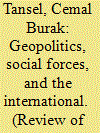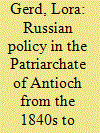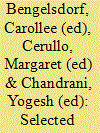|
|
|
Sort Order |
|
|
|
Items / Page
|
|
|
|
|
|
|
| Srl | Item |
| 1 |
ID:
145512


|
|
|
|
|
| Summary/Abstract |
This article contributes to current debates in materialist geopolitics and contemporary IR theorising by restating the centrality of social forces for conceptualising geopolitics. It does so by offering a detailed conceptual reading of the corpus of the ‘Eastern Question’, which is composed of a series of political analyses written by Marx and Engels in the period of 1853–6. This archive presents unique analytical and conceptual insights beyond the immediate temporal scope of the issue. I unpack this argument in three movements. The article (i) offers an overview of the debates on materialist geopolitics; (ii) contextualises the historical setting of the ‘Eastern Question’ and critically evaluates the great powers’ commitment to the European status quo; and (iii) constructs an original engagement with a largely overlooked corpus to reveal the ways in which Marx and Engels demonstrated the interwoven relationship between domestic class interests, the state, and the international system. I maintain that revisiting the ‘Eastern Question’ corpus (i) bolsters the existing materialist frameworks by underscoring the role of class as an analytical category; (ii) challenges an important historical pillar of the balance of power argument; and (iii) empirically strengthens the burgeoning scholarship in international historical sociology.
|
|
|
|
|
|
|
|
|
|
|
|
|
|
|
|
| 2 |
ID:
179766


|
|
|
|
|
| Summary/Abstract |
In the 19th century, the phrase the ‘Eastern Question’ in international relations in Europe was of central importance. The Eastern Question led to a long-lasting geopolitical and geo-economic fight between the Ottoman Empire and the various European empires. The main geopolitical factor was the fight for independence among the various peoples who inhabited the Ottoman Empire, as well as the political support provided to them by the European empires. One of those significant factors was the fight of one of the nations included in the Ottoman Empire — the Serbian struggle for independence. The Serbs had been part of the Ottoman Empire since the 14th century; however, in the 19th century, due to weakening of the Ottoman Empire, they sought independence. In achieving this, Russia played a central role. This article addresses how the Serbians gained independence from the Ottoman Empire in the 19th century and what role the political support of the Russian Empire played in these developments. Political factors take central stage here. Moreover, the article analyzes the international political processes in Europe during this period, mainly focusing on Great Britain, France, and Austria-Hungary. In the 19th century, the international situation related to the Eastern Question escalated. The main indication of this would be the Russian-Turkish War of 1877–1878. In the following conferences, Russia supported the independence of Serbia. This article shows why Russia supported Serbia, both economically as well as mentally.
|
|
|
|
|
|
|
|
|
|
|
|
|
|
|
|
| 3 |
ID:
179890


|
|
|
|
|
| Summary/Abstract |
Syria and Lebanon occupied a special place in the competition of the nineteenth-century Great Powers in the Eastern Question. Having entered this struggle, the Russian state used its accustomed routes of influence through the Orthodox Church. This article argues that the traditional practice of sending donations without asking for reports on their usage did not work in the nineteenth and early twentieth centuries. Diplomatic pressure combined with control over the money sent worked better. Confessional instruments of policy thus found new patterns in the age of nationalism. After the Crimean War, Russian imperialism was opposed to the Greek Great Idea in the Balkans and the Middle East; in Syria and Palestine Russian church policy was based on support for the Arabs. All methods of ‘soft power’ (the foundation of schools for the Arab population, attempts to (re)convert the Melkites to Orthodoxy, and gradual Arabisation of the high clergy of the Patriarchate of Antioch) were aimed at putting Syria and Lebanon under Russian control. Unlike in Palestine or Alexandria, this policy was successful: in the first decades of the nineteenth century the Arab Patriarchate of Antioch was completely financed by the Russian government. This article investigates whether the policy of Arabisation could have brought about stability in the region, and whether it really contributed to the realisation of the idea of Orthodox unification under Russian control.
|
|
|
|
|
|
|
|
|
|
|
|
|
|
|
|
| 4 |
ID:
081679


|
|
|
|
|
| Publication |
Karachi, Oxford University Press, 2006.
|
| Description |
xxiv, 619p.Hbk
|
| Standard Number |
9780195471632
|
|
|
|
|
|
|
|
|
|
|
|
Copies: C:1/I:0,R:0,Q:0
Circulation
| Accession# | Call# | Current Location | Status | Policy | Location |
| 053403 | 909.82/BEN 053403 | Main | On Shelf | General | |
|
|
|
|
|
|
|
|
|